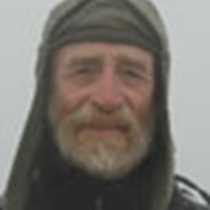Port Stanley, Falkland Islands
A noticeable change in the ocean signaled our proximity to the sheltered waters of the harbour entrance in the early morning hours. Long a safe refuge for whaling and trading ships ravaged by the intemperate southern ocean, the ancient wrecks still lying in the shallows bear somber testimony to the relentless power of the seas.
We walked through the small English village still weaving with the residual sway of our long sea journey from South Georgia. Strong ties to the UK are all around us, from the well frequented “locals” to the luxuriant hedgerows, speeding Land Rovers driving on the wrong side of the road, and even a most tastefully decorated English garden!
Even in this most distant of lands, a place once described by Charles Darwin as the most miserable of fogbound places, we find that man has, as always, fought and killed his own for some ill-defined and soon forgotten cause. The memorial to the Liberation of the Falklands in center town spells it out in gold-engraved and painful detail.
Of the 2,500 people living here, only 500 or so still make their living on the land. The sheep stations, called camps by the locals, were once the mainstay of the economy. Now most of the income comes from selling fishing rights to a multinational fleet, which targets the several species of squid abundant in the 200-mile economic zone belonging to the Falklands. Tourism is also an important source of revenue, and offshore oil exploration would seem to indicate that petroleum production might someday also play an important role in the future of this area.
The Falkland Islands are an overseas British territory, at present in the fortunate position of being protected by the military might of the United Kingdom and receiving enough revenue from local resources to be self sufficient. As visitors to such a distant outpost of civilization, most of us have probably pondered the question of whether we could live contentedly in such a place…
A noticeable change in the ocean signaled our proximity to the sheltered waters of the harbour entrance in the early morning hours. Long a safe refuge for whaling and trading ships ravaged by the intemperate southern ocean, the ancient wrecks still lying in the shallows bear somber testimony to the relentless power of the seas.
We walked through the small English village still weaving with the residual sway of our long sea journey from South Georgia. Strong ties to the UK are all around us, from the well frequented “locals” to the luxuriant hedgerows, speeding Land Rovers driving on the wrong side of the road, and even a most tastefully decorated English garden!
Even in this most distant of lands, a place once described by Charles Darwin as the most miserable of fogbound places, we find that man has, as always, fought and killed his own for some ill-defined and soon forgotten cause. The memorial to the Liberation of the Falklands in center town spells it out in gold-engraved and painful detail.
Of the 2,500 people living here, only 500 or so still make their living on the land. The sheep stations, called camps by the locals, were once the mainstay of the economy. Now most of the income comes from selling fishing rights to a multinational fleet, which targets the several species of squid abundant in the 200-mile economic zone belonging to the Falklands. Tourism is also an important source of revenue, and offshore oil exploration would seem to indicate that petroleum production might someday also play an important role in the future of this area.
The Falkland Islands are an overseas British territory, at present in the fortunate position of being protected by the military might of the United Kingdom and receiving enough revenue from local resources to be self sufficient. As visitors to such a distant outpost of civilization, most of us have probably pondered the question of whether we could live contentedly in such a place…




